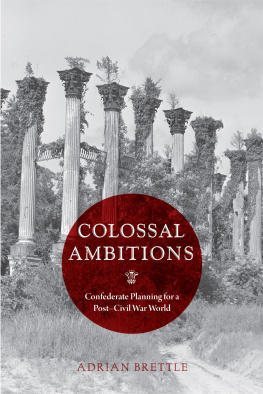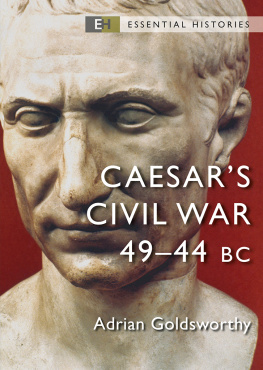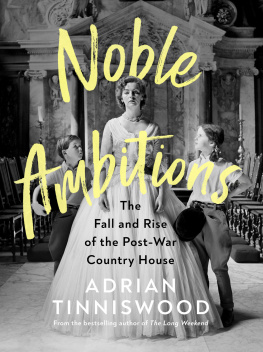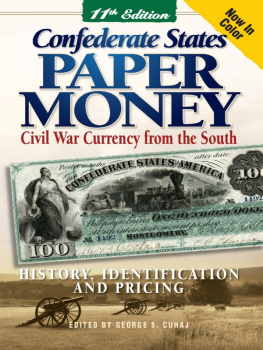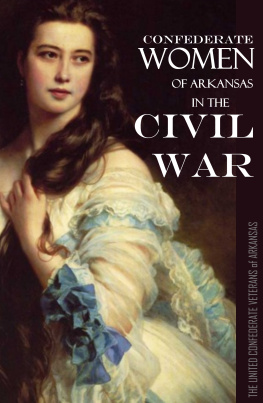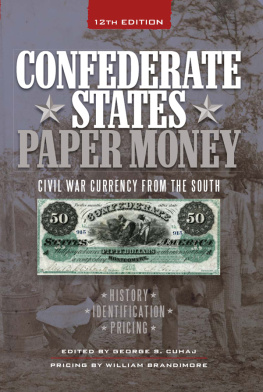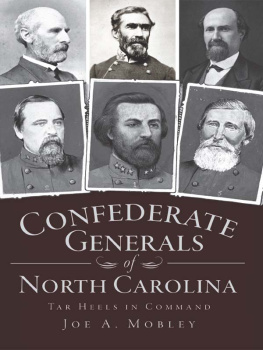Adrian Brettle - Colossal Ambitions: Confederate Planning for a Post–Civil War World
Here you can read online Adrian Brettle - Colossal Ambitions: Confederate Planning for a Post–Civil War World full text of the book (entire story) in english for free. Download pdf and epub, get meaning, cover and reviews about this ebook. year: 2020, publisher: University of Virginia Press, genre: History. Description of the work, (preface) as well as reviews are available. Best literature library LitArk.com created for fans of good reading and offers a wide selection of genres:
Romance novel
Science fiction
Adventure
Detective
Science
History
Home and family
Prose
Art
Politics
Computer
Non-fiction
Religion
Business
Children
Humor
Choose a favorite category and find really read worthwhile books. Enjoy immersion in the world of imagination, feel the emotions of the characters or learn something new for yourself, make an fascinating discovery.
- Book:Colossal Ambitions: Confederate Planning for a Post–Civil War World
- Author:
- Publisher:University of Virginia Press
- Genre:
- Year:2020
- Rating:3 / 5
- Favourites:Add to favourites
- Your mark:
- 60
- 1
- 2
- 3
- 4
- 5
Colossal Ambitions: Confederate Planning for a Post–Civil War World: summary, description and annotation
We offer to read an annotation, description, summary or preface (depends on what the author of the book "Colossal Ambitions: Confederate Planning for a Post–Civil War World" wrote himself). If you haven't found the necessary information about the book — write in the comments, we will try to find it.
Adrian Brettle: author's other books
Who wrote Colossal Ambitions: Confederate Planning for a Post–Civil War World? Find out the surname, the name of the author of the book and a list of all author's works by series.
Colossal Ambitions: Confederate Planning for a Post–Civil War World — read online for free the complete book (whole text) full work
Below is the text of the book, divided by pages. System saving the place of the last page read, allows you to conveniently read the book "Colossal Ambitions: Confederate Planning for a Post–Civil War World" online for free, without having to search again every time where you left off. Put a bookmark, and you can go to the page where you finished reading at any time.
Font size:
Interval:
Bookmark:
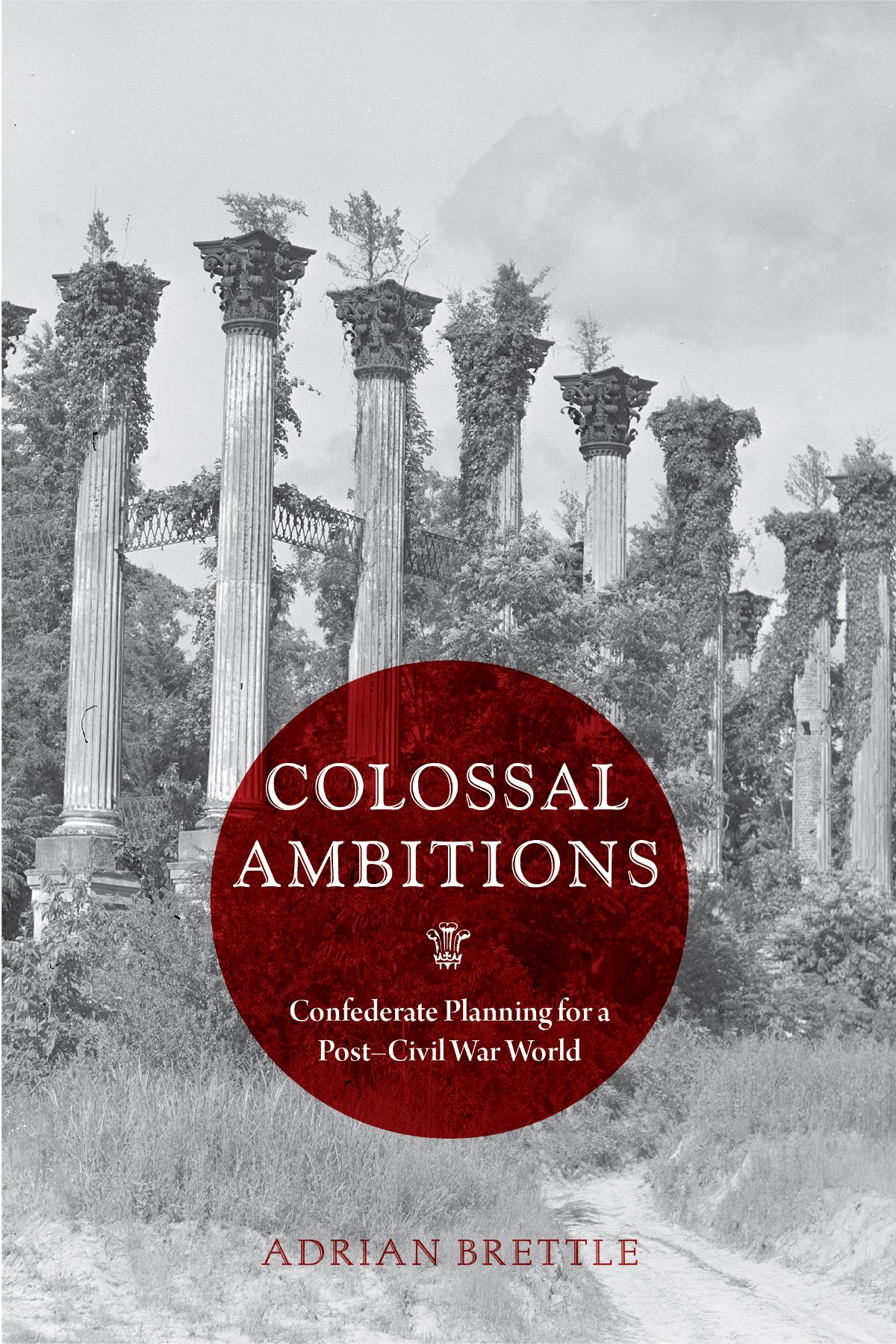
A Nation Divided: Studies in The Civil War Era
ORVILLE VERNON BURTON AND ELIZABETH R. VARON, EDITORS
Adrian Brettle
University of Virginia Press
Charlottesville and London
University of Virginia Press
2020 by the Rector and Visitors of the University of Virginia
All rights reserved
First published 2020
Library of Congress Cataloging-in-Publication Data
Names: Brettle, Adrian, 1972 author.
Title: Colossal ambitions : Confederate planning for a postCivil War world / Adrian Brettle.
Other titles: Nation divided.
Description: Charlottesville : University of Virginia Press, 2020. | Series: A nation divided : studies in the Civil War era | Includes bibliographical references and index.
Identifiers: LCCN 2020000762 (print) | LCCN 2020000763 (ebook) | ISBN 9780813944371 (cloth) | ISBN 9780813944388 (ebook)
Subjects: LCSH : Confederate States of AmericaHistory. | Confederate States of AmericaPolitics and government. | United StatesHistoryCivil War, 18611865.
Classification: LCC E 487 . B 74 2020 (print) | LCC E 487 (ebook) | DDC 973.7/13dc23
LC record available at https://lccn.loc.gov/2020000762
LC ebook record available at https://lccn.loc.gov/2020000763
Cover illustration: Windsor ruins, Port Gibson, Mississippi; photograph by Marion Post Wolcott, August 1940 (Library of Congress, Prints and Photographs Division, FSA/OWI Collection)
To the memory of Frank Johnson
The debts accumulated during the completion of this book are numerous. Family and friends have helped me enormously. Many years ago, the late Frank Johnson first started me thinking about writing and research. My parents, Harvey and Lindsay Brettle, backed my decision to choose an academic career without reserve, while both my brothers, Oliver and Linton Brettle, generously volunteered to serve as readers (and their offers were gratefully accepted). The late David Eisenberg was of great help and encouragement. Dick Crampton provided last-minute assistance on the dissertation, while Chris and Nadia Payne were instrumental in getting me to seriously think about going back to school. I am so grateful that Chris has gone on to be a loyal reader of various drafts of the book.
I have been fortunate to have had excellent teachers and mentors. Gary Gallagher has provided unstinting support from my choosing of the topic until the completion of the manuscript. I have also benefited from the time, advice, and encouragement of Michael Holt, Peter Onuf, and Elizabeth Varon. Other history department faculty at the University of Cambridge, the University of Virginia, and elsewhere have helped me understand the field and, whether they realize it or not, have contributed to this project. These people include Brian Balogh, Sir David Cannadine, Jon Parry, Brendan Simms, Paul Halliday, John Stagg, Joseph Kett, the late Clive Trebilcock, the late Mark Kaplanoff, Boyd Hilton, Andrew Roberts, Hywel Williams, Max Edelson, the late Elizabeth Brown Pryor, Joan Waugh, Philip Zelikow, and Paul and Adrienne Kershaw. Finally, I would like to thank Karen Chase of the English Department at University of Virginia and the members of her class on Charles Dickens; this course taught me the importance of ambition to the mid-nineteenth century mind.
Several aspects of this manuscript have been presented at various conferences and in other forums. I would like to thank Phil Williams, Barbara Wright, Mary Roy Dawson Edwards, Sandy von Thelen, Trice Taylor, Bryan Hagan, Robert May, Robert Bonner, Sir Richard Carwardine, Jay Sexton, Brian Schoen, Bruce Levine, Alan Taylor, Glenna Matthews, Adam Arenson, Daniel Lynch, Don Doyle, Pat Kelly, Edward Rugemer, Matthew Karp, Thomas Schoonover, Howard Jones, Paul Quigley, Aaron Sheehan-Dean, Hugh Dubrelle, Niels Eichhorn, Amanda Foreman, C. Wyatt Evans, David Gleeson, Simon Keith Lewis, David Brown, Jeremy Black, and many others for their suggestions and encouragement.
The book could not have been completed without the fellowships, grants, and assistantships I have been lucky to be awarded. The Lee-Jackson Foundation awarded me an Archibald Craig Fellowship for my first year at the University of Virginia. Subsequently I have benefited from support from the University of Virginia history department and the Graduate School of Arts and Sciences, the Bradley Foundation, the International Center for Jefferson Studies, the Boston Athenaeum, the Virginia Historical Society, the Filson Historical Society, the Gilder Lehrman Institute, the Huntington Library, the Dolph Briscoe Center for American History at the University of Texas, Austin, and the North Caroliniana Society. Staff at these organizations and libraries have been of invaluable help to me in navigating their collections, especially Brenda Gunn and Margaret Schlankey at UT Austin; Mary Warnement at the Boston Athenaeum; Glenn Crothers at the Filson; Jason Tomberlin at North Carolininana; Steve Hindle at the Huntington; Tom Mullusky at the GLI; Frances Pollard and Kathleen Wilkins at the VHS; Andrew Jackson OShaughnessy, Christa Derksheide, Ann Berkes, and Jack Robertson at the ICJS.
Several colleagues at the University of Virginia assisted in this project, including Will Kurtz, Emily Seinfeld, and Rhonda Barlow, who have been willing readers and editors. I have also repeatedly profited from the vibrant discussion and constructive suggestions of attendees in meetings of both the Early American Seminar and Civil War Group at the University of Virginia. I would like to thank all of the many participants over the last six years, particularly Mike Caires, Jon Greenspan, Nic Wood, Whitney Martinko, Peter Luebke, David Flaherty, Randy Lewis Flaherty, Billy Wayson, and Adam Dean, all of whom have helped me on my way. Finally, I would like to thank the staff the Albert and Shirley Small Special Collections library for their unstinting support.
The department of history at Rowan University awarded me a teaching fellowship and allowed me to present chapters of the book at its faculty work-in-progress seminars. I would especially like to thank William Carrigan, Emily Blanck, James Heinzen, and Stephen Hague for their companionship, freewheeling discussions, and encouragement.
During 201718, I was lucky to be the beneficiary of a joint project between the John L. Nau III Center for Civil War History at the University of Virginia and the American Civil War Museum in Richmond. This enterprise was funded by a grant from the Andrew W. Mellon Foundation, which aims to bring new scholarship into the public sphere. Working as part of a team preparing an exhibit at the museum based on my book has been most rewarding, not least enabling me to sharpen and better communicate my arguments. John Coski at the museum has helped me with all manner of questions. My colleagues on the project, including Chris Graham, the guest curator, Ana Edwards, and Meika Downey, have my lasting gratitude; I thank Chris for reading through the manuscript.
In my present academic home, Arizona State University, I have received invaluable advice and last-minute guidance from Don Critchlow, Calvin Schermerhorn, Jon Barth, Daniel Strand, and Mark Power Smith. Lively meetings with the students of the Program for Political History and Leadership in ASUs School of Historical, Philosophical, and Religious Studies continually stimulate my thinking.
A number of other people have read the book through in its entirety, and I am deeply grateful to them all. Two readers for the University of Virginia PressRobert E. May and one who remained anonymoustwice have offered critical advice, which I adopted wholesale in my revisions. Beverly Brown and Ann Horner not only provided me with somewhere to live in Richmond and Charlottesville, respectively, but have also read through the whole manuscript carefully and saved me from many mistakes. Dick Holway, my editor at the University of Virginia Press, has been a source of constant support and encouragement in the whole process.
Next pageFont size:
Interval:
Bookmark:
Similar books «Colossal Ambitions: Confederate Planning for a Post–Civil War World»
Look at similar books to Colossal Ambitions: Confederate Planning for a Post–Civil War World. We have selected literature similar in name and meaning in the hope of providing readers with more options to find new, interesting, not yet read works.
Discussion, reviews of the book Colossal Ambitions: Confederate Planning for a Post–Civil War World and just readers' own opinions. Leave your comments, write what you think about the work, its meaning or the main characters. Specify what exactly you liked and what you didn't like, and why you think so.

